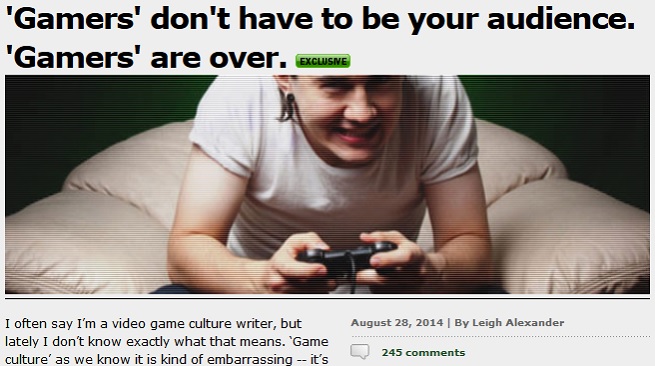Under pressure from an increasingly fractious gamer movement, Intel pulled its advertising from the video game developer news website Gamasutra. Those gamers were upset that columnist Leigh Alexander took a pro-feminist stance on gender representation in the industry.
Then, after the world’s largest chip maker was labeled as “anti-feminist,” Intel issued its own apology for the impression that it created.
 Friday evening, Intel wrote, “We take feedback from customers seriously. For the time being, Intel has decided not to continue with our current ad campaign on the gaming site Gamasutra. However, we recognize that our action inadvertently created a perception that we are somehow taking sides in an increasingly bitter debate in the gaming community. That was not our intent, and that is not the case.”
Friday evening, Intel wrote, “We take feedback from customers seriously. For the time being, Intel has decided not to continue with our current ad campaign on the gaming site Gamasutra. However, we recognize that our action inadvertently created a perception that we are somehow taking sides in an increasingly bitter debate in the gaming community. That was not our intent, and that is not the case.”
The company added, “When it comes to our support of equality and women, we want to be very clear: Intel believes men and women should be treated the same. And, diversity is an integral part of our corporate strategy and vision with commitments to improve the diversity of our workforce. And while we respect the right of individuals to have their personal beliefs and values, Intel does not support any organization or movement that discriminates against women. We apologize, and we are deeply sorry if we offended anyone.”
Gamasutra, Alexander, and Intel are all caught up in an Internet firestorm known as #GamerGate over sexism and journalistic ethics. The movement of self-identified gamers took offense at a column by Alexander criticizing the white male dominance in gamer culture. Her article had the headline “‘Gamers’ don’t have to be your audience. ‘Gamers’ are over.” She noted that just about everyone is a gamer now and that term has lost its meaning. She argued that “angry young men” are not the sole demographic behind the label “gamer” anymore.
She wrote, “But it’s unstoppable. A new generation of fans and creators is finally aiming to instate a healthy cultural vocabulary, a language of community that was missing in the days of ‘gamer pride’ and special interest groups led by a product-guide approach to conversation with a single presumed demographic.”
Toward the end of the article, Alexander wrote, “‘Gamer’ isn’t just a dated demographic label that most people increasingly prefer not to use. Gamers are over. That’s why they’re so mad.”
And mad they got. The supporters of the hashtag #GamerGate launched a campaign against companies that advertise on video game websites such as Gamasutra and Kotaku. As a result, Intel pulled its ads from Gamasutra, at first saying, “We take feedback from our customers very seriously, especially as it relates to contextually relevant content and placements.”
But supporters of Alexander organized their own counter-campaign against Intel, arguing that the Internet mob missed the point in Alexander’s piece. That, evidently, led to Intel’s apology.
VentureBeat's mission is to be a digital town square for technical decision-makers to gain knowledge about transformative enterprise technology and transact. Learn More

